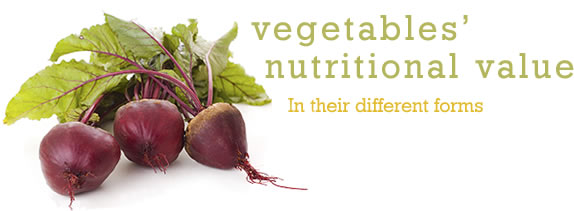Health Tips - Vegetables' Nutritional Value

When you read Vegetables Defined, you will see that the term vegetable can apply to different parts of the plant, such as the leaf, stem, or root. Depending on which part of the plant you eat and how you prepare it, the nutrition levels vary.

Generally-speaking, vegetables contain little fat and are high in fiber. Different parts of the plant contain varying amounts of carbohydrates. For example, roots such as carrots and beets contain more carbohydrates than lettuce leaves or celery stems.
However in general, vegetables are low in calories which can help lower calorie intake as part of a weight loss diet.
Declining nutritional value of vegetables:
- Whole vegetables eaten raw, with skins when possible, are high in fiber, vitamins, minerals, certain amino acids, and healthy fatty acids. They contain varying amounts of carbohydrates. Whole vegetables that are pureed or blended offer all the same benefits.
- Whole vegetables, unheated and frozen, seem to contain all the above nutrition with no significant change.
- Vegetable juice made fresh, such as at home, from whole vegetables with skins has less fiber, but is high in various nutrients. It has varying amounts of carbohydrates depending on the vegetable part being juiced. For example, beets and carrots make a higher carbohydrate juice.
- Vegetable juice, processed and sold in stores, has less fiber and few nutrients, and is usually high in carbohydrates. Think of it as drinking sugar with not a lot of nutritional value.
Unprocessed vegetables contain various phytochemicals (derived from Greek "phyton" meaning plant), which are chemicals such as beta-carotene, that occur naturally in plants. There is evidence from laboratory studies that phytochemicals in vegetables reduce the risk of cancer, possibly due to the fiber, antioxidants, and anti-inflammatory effect.
Regular consumption of fresh vegetables is associated with reduced risks of cancer, cardiovascular disease (especially heart disease), diabetes, stroke, Alzheimer's disease, cataracts, and some of the functional declines associated with aging. Diets that include a sufficient amount of fruits and vegetables help reduce the chance of developing kidney stones and reduce bone loss.
Vegetables generally create more alkalinity when broken down in the body. This results in more energy, better control of all bacteria, viruses, and fungus, and an anti-aging effect in the long run.
Suggestions:
- Read more on the differences between juices.
- Do not buy vegetable juice from the store.
- Eat many servings a day of varied whole vegetables, with skin when possible.
- Blend whole vegetables in your Vita-mix to make smoothies.
- There are chemicals in certain vegetables that are broken down by good flora in your gut. So, take a good acidophilus product (click here to purchase Total Flora acidophilus from my Front Desk for $35 + tax) several days a week to help you get the most out of your vegetables. More on that next...
Eating healthy forms of vegetables can vastly improve your health!
Dr. Pepi
March 21, 2011
